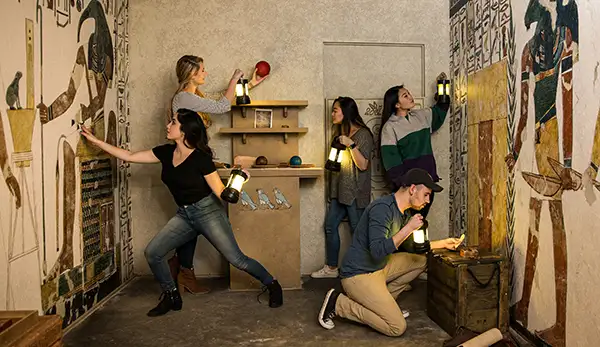Team Methods: How to Collaborate Successfully in an Escape Room
Navigating the complexities of an escape room requires greater than mere interest; it needs a well-coordinated technique based in clear communication, calculated function projects, and proficient time monitoring. Groups need to proactively listen to each participant's understandings, designate functions that line up with private toughness, and keep routine check-ins to make sure emphasis and prevent redundancy. By cultivating a setting that values cohesion and flexibility, groups can substantially enhance their efficiency and success rates. The nuances of these approaches can transform the experience, yet exactly how precisely can they be carried out to optimize the potential for success?
Establish Clear Interaction

To facilitate clear interaction, it is important to mark a central point of call for information circulation. This role entails summarizing searchings for and suggested techniques to ensure every person remains on the same web page. Additionally, embracing a systematic approach to conversations can avoid chaotic exchanges. For example, quick, focused updates from each staff member can keep the team informed without frustrating them with information.

Appoint Roles Strategically
While clear interaction establishes the structure for efficient synergy, appointing duties strategically ensures that each employee's strengths are made use of properly. In a retreat room circumstance, the time-sensitive and complex nature of obstacles necessitates an efficient approach to job delegation. By identifying and leveraging private expertises, teams can enhance their analytical capabilities and improve overall performance.
First, examine the unique skills and features of each participant. A person with a keen eye for information might succeed in locating hidden items, while a rational thinker could be better matched to solving puzzles. It's similarly important to have a leader who can manage progression, handle the timeline, and make crucial calls when required. This function commonly calls for solid business and interpersonal skills.
Second, make sure that functions are versatile and adaptable. As new difficulties arise, the team must have the ability to pivot, reapportioning jobs as called for. This adaptability helps maintain energy and prevents bottlenecks that might occur because of inflexible duty tasks.
Eventually, a critical approach to duty job not just makes the most of the staminas of each team participant but also fosters a natural environment, driving the team towards an effective getaway.
Make Use Of Diverse Abilities
Acknowledging and taking have a peek at these guys advantage of the diverse abilities within your team can significantly elevate your efficiency in an escape area. Each team participant brings distinct toughness to the table, and successfully leveraging these capacities can speed up analytic and enhance overall effectiveness. A team member with strong logical abilities may excel at decoding complicated codes or patterns, while another with keen empirical capacities might rapidly detect hidden clues that others could neglect.
Urge group participants to articulate their insights and ideas quickly, making sure that all prospective options are considered. In addition, appointing jobs that line up with each member's staminas can prevent bottlenecks and ensure that progression is continual.
Additionally, diversity in skills frequently translates to variety in assuming designs, which is vital in a getaway room setup. While some difficulties may call for sensible reasoning and accuracy, others could profit from creative and association of ideas. By identifying and leveraging this diversity, groups can attend to a more comprehensive array of obstacles better, consequently boosting their possibilities of a successful retreat.
Manage Time Effectively

First, allocate initial mins for a link quick survey of the space. Recognize visible challenges and split jobs based upon staff member' strengths, ensuring that nobody is idle. Set inner time checkpoints to examine development periodically; for instance, purpose to have half the challenges resolved by the mid-point of the game. This technique can aid keep the group focused and prevent time from escaping undetected.
Additionally, prevent tunnel vision. If a challenge is taking too long, rotate employee or carry on to another challenge, returning later on with fresh viewpoints. Communication is paramount-- keep everybody upgraded on resolved puzzles and remaining jobs to avoid repetitive efforts.
Lastly, utilize any kind of hints or hints More about the author sparingly however tactically - best escape room. Recognizing when to ask for aid can save useful time. By sticking to these time monitoring principles, groups can considerably enhance their possibilities of a successful and satisfying retreat area experience
Debrief and Show
Representation is a vital facet of team development and enhancement in the context of retreat rooms. When the difficulty is completed, whether effectively or otherwise, it is crucial for the group to engage in a structured debriefing session. This procedure permits employee to analyze their efficiency, recognize strengths, and pinpoint areas for renovation.
Begin the debrief by discussing what went well. Highlight specific circumstances of efficient interaction, analytic, and cooperation. Recognizing these favorable habits reinforces them and encourages their rep in future difficulties.
Review minutes of complication, miscommunication, or ineffective techniques. Encourage an open and constructive discussion where team members can share their perspectives without fear of objection.
Verdict
Finally, effective partnership in a retreat room is predicated upon clear interaction, calculated function jobs, the reliable application of varied skills, and efficient time management. Normal check-ins and organized debriefings are vital for preserving emphasis and cultivating continual enhancement. By creating a cohesive and adaptive group atmosphere, the possibility of efficiently resolving challenges and accomplishing the purpose of getting away the area is significantly boosted. This method not just makes sure success but also promotes collective development and learning.